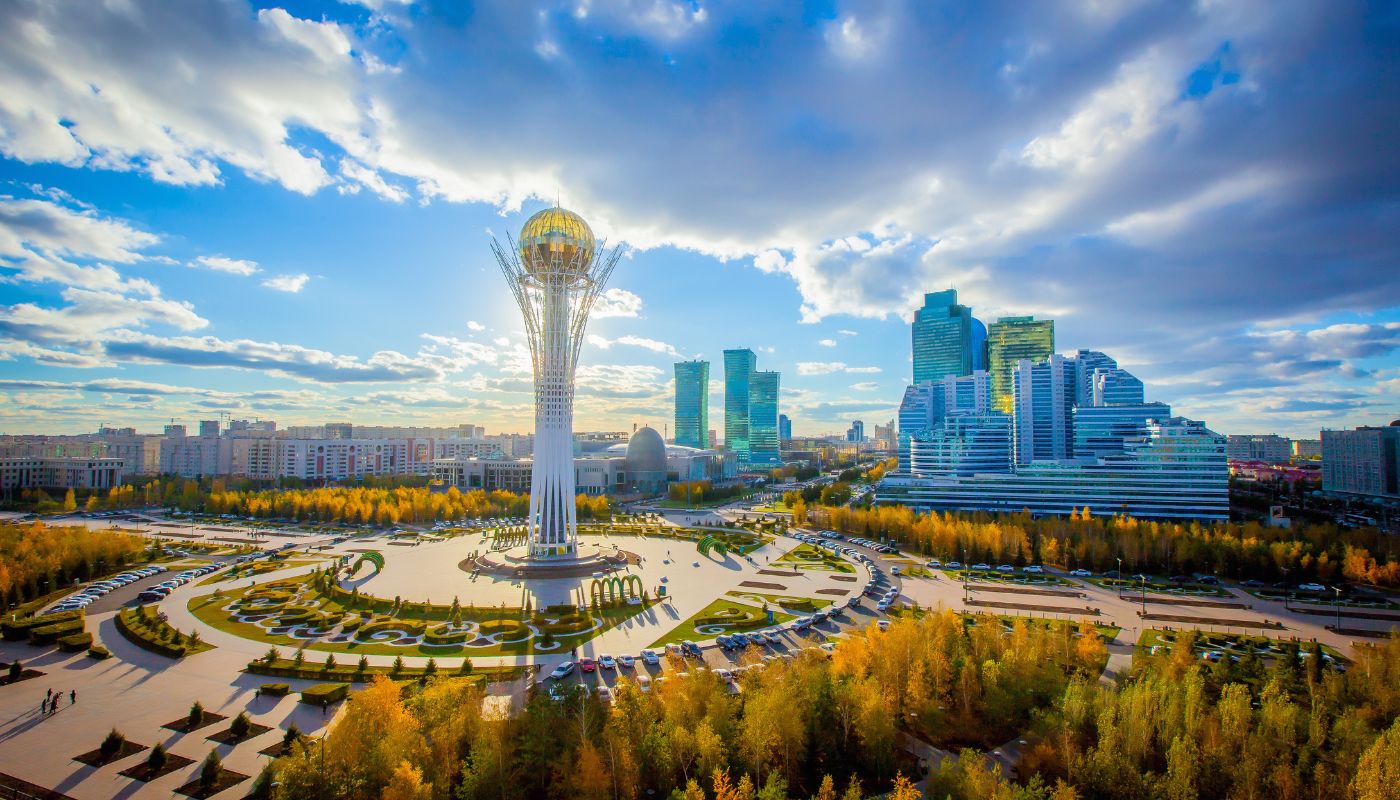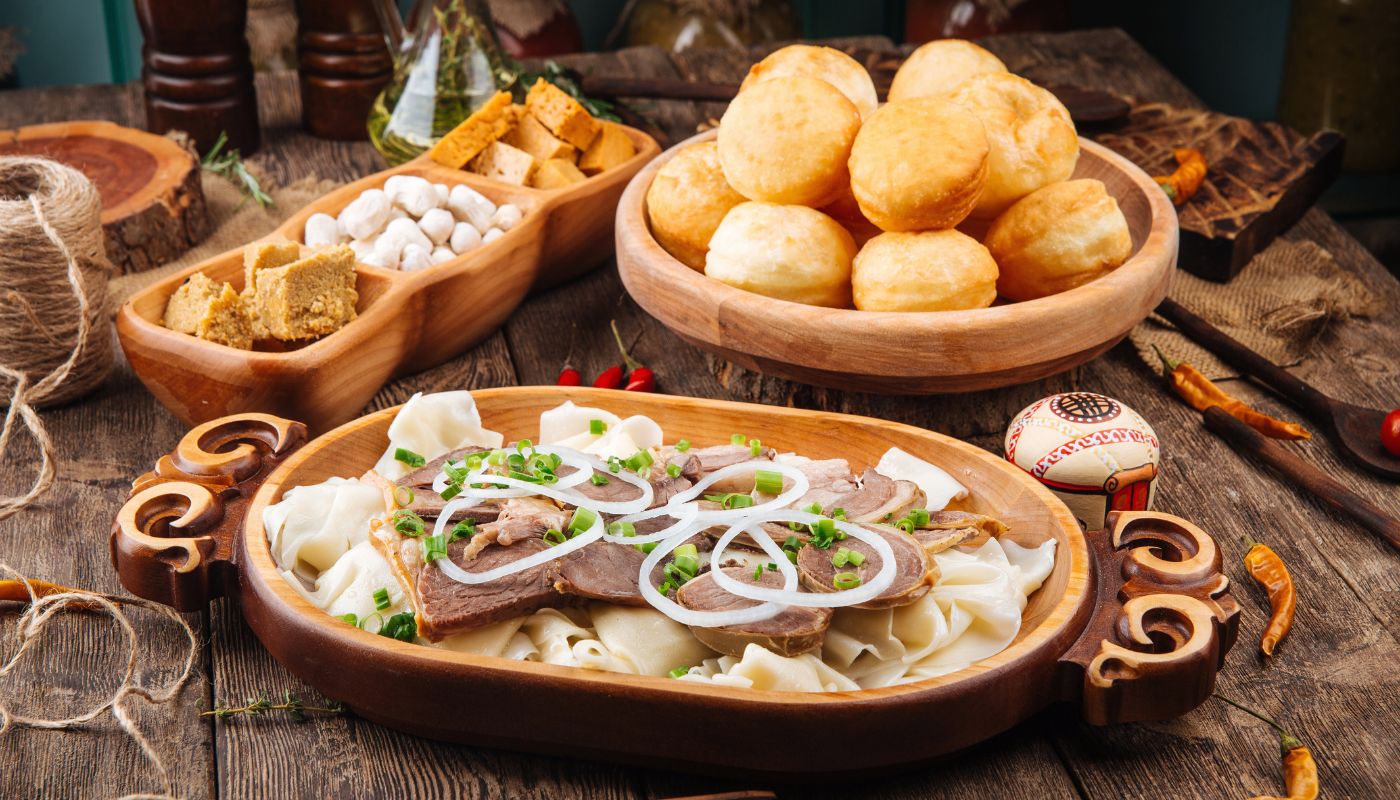Where is Kazakhstan?
Kazakhstan is a transcontinental country, straddling both Europe and Central Asia. It is the world’s largest landlocked country and the ninth-largest country overall. Kazakhstan shares its borders with Russia to the north, China to the east, Kyrgyzstan and Uzbekistan to the south, Turkmenistan to the southwest, and has a coastline along the Caspian Sea to the west. The capital city is Nur-Sultan, formerly known as Astana.
Kazakhstan, historically a crucial part of the Silk Road, has steadily become an intriguing travel destination due to its rich cultural heritage and diverse landscapes. The country’s vibrant cities and ancient sites offer a unique blend of history and modernity. Almaty, the largest city, is known for its cultural landmarks such as the Zenkov Cathedral and the Central State Museum, as well as its bustling markets and nearby mountain resorts like Medeu and Shymbulak. Nur-Sultan (Astana), the current capital, captivates visitors with its futuristic architecture, including the Bayterek Tower and Khan Shatyr Entertainment Center, reflecting Kazakhstan’s modern aspirations.
Why travel to Kazakhstan?
Historic cities like Turkestan and Shymkent provide deeper insights into the country’s past. Turkestan’s Mausoleum of Khoja Ahmed Yasawi, a UNESCO World Heritage Site, stands as a significant spiritual and architectural landmark. Shymkent, one of Kazakhstan’s oldest cities, offers a blend of historical sites and modern amenities, making it a compelling stop for travelers.

Aksu-Zhabagly Nature Reserve
Kazakhstan’s natural attractions are equally impressive. The Charyn Canyon, often compared to the Grand Canyon, features stunning rock formations and vibrant landscapes. Lake Balkhash, one of Asia’s largest lakes, offers a unique split between fresh and saltwater, ideal for fishing and boating. The Altai Mountains and Kolsai Lakes present breathtaking scenery and outdoor activities like hiking and skiing, while the Aksu-Zhabagly Nature Reserve, the oldest in Central Asia, is renowned for its biodiversity and stunning vistas.
Kazakhstan’s investment in infrastructure and tourism has enhanced its appeal, with improved transportation, luxury accommodations, and better visitor services. This combination of historical depth, natural beauty, and modern conveniences makes Kazakhstan a compelling destination for travelers seeking adventure, cultural enrichment, and unique experiences.
Is it safe to travel in Kazakhstan?
Kazakhstan is generally a safe destination with a low to moderate crime rate, though petty crimes like pickpocketing and scams targeting tourists can occur in larger cities such as Almaty and Nur-Sultan. Violent crime is less common, but it’s prudent to stay vigilant, particularly in crowded areas and when using public transport. Healthcare in major cities is good, but it varies significantly in rural areas, so travelers should ensure they have appropriate vaccinations and travel insurance. Tap water is not always safe to drink, so bottled or boiled water is recommended.
Road conditions range from well-maintained highways to poorly kept rural roads, and driving standards can be unpredictable. Public transport is widely available and generally safe, though it’s important to be mindful of personal belongings. Kazakhstan experiences extreme weather, from very cold winters to hot summers, and is prone to earthquakes, particularly in the southeast. The country is politically stable, but it’s wise to avoid protests and large gatherings. Respecting local customs, laws, and carrying identification at all times will help ensure a safe and pleasant stay.
What to See in Kazakhstan
- Astana (Nur-Sultan): The capital city is a showcase of modern architecture and urban design. Notable attractions include:
- Bayterek Tower: A symbol of Astana, offering panoramic views of the city.
- Palace of Peace and Reconciliation: A pyramid-shaped building hosting conferences and cultural events.
- Khan Shatyr Entertainment Center: A large transparent tent structure housing a shopping mall, indoor beach, and entertainment facilities.
- Astana Opera: A stunning venue for opera and ballet performances.

Astana (Nur-Sultan)
- Almaty: The largest city and cultural heart of Kazakhstan, known for its vibrant atmosphere and beautiful setting at the foot of the Trans-Ili Alatau mountains. Key attractions include:
- Zenkov Cathedral: A colorful Russian Orthodox cathedral built entirely of wood.
- Central State Museum: One of the largest museums in Central Asia, showcasing the history and culture of Kazakhstan.
- Medeu Skating Rink: Located in the mountains above Almaty, it’s the highest ice rink in the world.
- Kok-Tobe Hill: Offers stunning views of Almaty and features a variety of attractions, including a small amusement park and a zoo.
- Charyn Canyon: Often compared to the Grand Canyon, this natural wonder is located in southeastern Kazakhstan. It features dramatic rock formations and offers opportunities for hiking, photography, and exploring the unique landscape.
- Lake Kaindy: Known for its submerged forest, the lake was formed by an earthquake in 1911. The turquoise water and the eerie sight of tree trunks rising from the lake make it a must-see.
- Altai Mountains: This region is ideal for trekking, mountaineering, and wildlife watching. The Altai Mountains offer some of the most stunning and untouched natural landscapes in Kazakhstan.
- Kolsai Lakes: A series of three alpine lakes in the northern Tien Shan mountains. The area is perfect for hiking, camping, and enjoying the serene natural beauty.
- Baikonur Cosmodrome: The world’s first and largest operational space launch facility, where you can learn about the history of space exploration and possibly witness a rocket launch.
What to Do
- Hiking and Trekking: With its diverse landscapes, Kazakhstan is a hiker’s paradise. Popular areas include the Tien Shan mountains, the Altai region, and national parks like Altyn-Emel and Kolsai Lakes.
- Horseback Riding: Experience the traditional nomadic lifestyle by exploring the steppe on horseback. Various tours offer horseback riding through scenic areas.
- Skiing and Snowboarding: The Shymbulak Ski Resort near Almaty is a top destination for winter sports enthusiasts, featuring modern facilities and stunning mountain views.
- Cultural Tours: Visit historical and cultural sites such as:
- Mausoleum of Khoja Ahmed Yasawi: A UNESCO World Heritage site in Turkestan, an important center of Islamic culture.
- Tamgaly Petroglyphs: Another UNESCO site, featuring ancient rock carvings that date back to the Bronze Age.
- Yurt Stays: Experience staying in a traditional Kazakh yurt, a round tent used by nomadic people. Many tours offer yurt stays combined with cultural activities and traditional meals.
Food
Kazakh cuisine is rich and hearty, reflecting the country’s nomadic heritage and diverse cultural influences.

Beshbarmak
- Beshbarmak: The national dish, made from boiled meat (usually lamb or beef) served over flat noodles, accompanied by an onion sauce. It’s traditionally eaten with the hands.
- Kazy: A traditional sausage made from horse meat, often served as part of a cold meat platter.
- Shubat: Fermented camel milk, which has a slightly sour taste and is considered a traditional beverage.
- Kumys: Fermented mare’s milk, another traditional drink known for its unique flavor and slight effervescence.
- Lagman: A dish of hand-pulled noodles with meat (often lamb or beef) and vegetables, reflecting the influence of Central Asian cuisines.
- Plov: A rice dish with meat, carrots, and onions, similar to pilaf, popular across Central Asia.
- Baursak: Fried dough balls are often served as a snack or dessert, sometimes drizzled with honey or syrup.
Culture
Kazakhstan’s culture is a rich tapestry of traditional nomadic practices, Soviet influences, and modern developments.
- Hospitality: Kazakh people are renowned for their hospitality. Guests are often welcomed with tea and snacks, and it’s customary to offer the best food to visitors.
- Music and Dance: Traditional Kazakh music features instruments like the dombra (a two-stringed lute) and the kobyz (a bowed instrument). Folk dances are performed during festivals and celebrations, showcasing the rich cultural heritage.
- Festivals:
- Nauryz: Celebrated on March 21st, marking the Persian New Year and the arrival of spring. It’s a time for family gatherings, traditional music and dance, and special foods like Nauryz kozhe, a festive soup.
- Kurban Ait: Also known as Eid al-Adha, an important religious holiday celebrated with communal prayers and feasts.
- Yurts: These portable round tents are a symbol of Kazakh culture and heritage. Yurts are still used in rural areas and during cultural festivals, offering a glimpse into the traditional nomadic way of life.
- Traditional Clothing: Traditional Kazakh attire includes items like the shapan (a long, ornate robe), the saukele (a tall, conical hat worn by brides), and the takhia (a type of cap).
Hotels to consider during your stay
Best Western Plus Astana: Offers a modern stay for travelers. Its central location puts you near key attractions and business centers, while the hotel itself boasts a contemporary feel, a fitness center, free parking, and even a private dining room with a billiard table for a unique gathering.
Sport Hotel Terra: Ideal for adventurers seeking a luxurious mountain escape. This hotel combines modern amenities like an attentive staff, rooftop spa with infinity pool, and on-site dining with the thrill of a mountain location. You can unwind at the spa or bar after a day of exploration, all within the hotel itself.
Hilton Garden Inn Astana: A good option for travelers seeking a comfortable and relaxed stay in Astana. It offers modern rooms and suites at a likely reasonable price point, along with a casual restaurant and bar for convenient dining. Plus, you’ll enjoy the perk of free Wi-Fi to stay connected during your trip.

Hilton Garden Inn Astana
Traveling to Kazakhstan in 2024 offers a unique blend of natural beauty, cultural richness, and adventurous activities. Whether exploring futuristic cities like Astana, hiking through breathtaking landscapes, experiencing traditional nomadic life, or tasting unique Kazakh dishes, there is something for every traveler. The country’s warm hospitality and vibrant cultural heritage make it a fascinating destination for anyone looking to explore a lesser-known part of the world.
Biggest Mountains in Asia from no less than 10 countries




